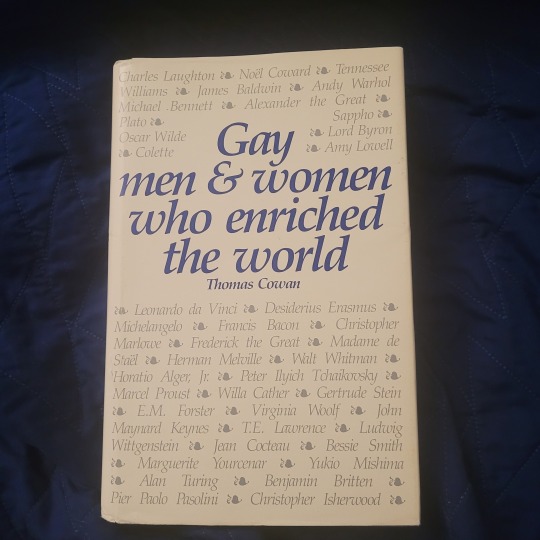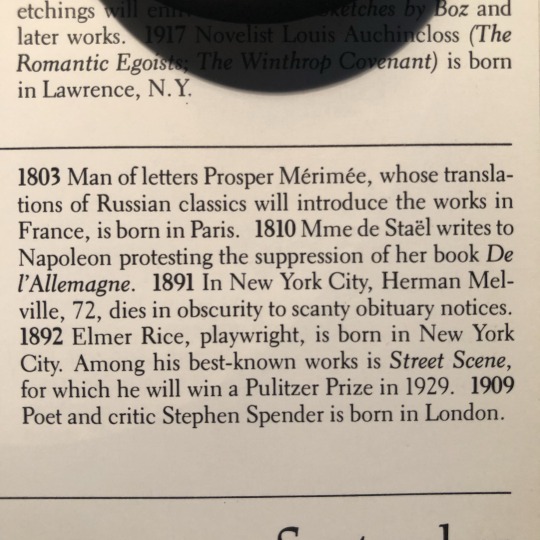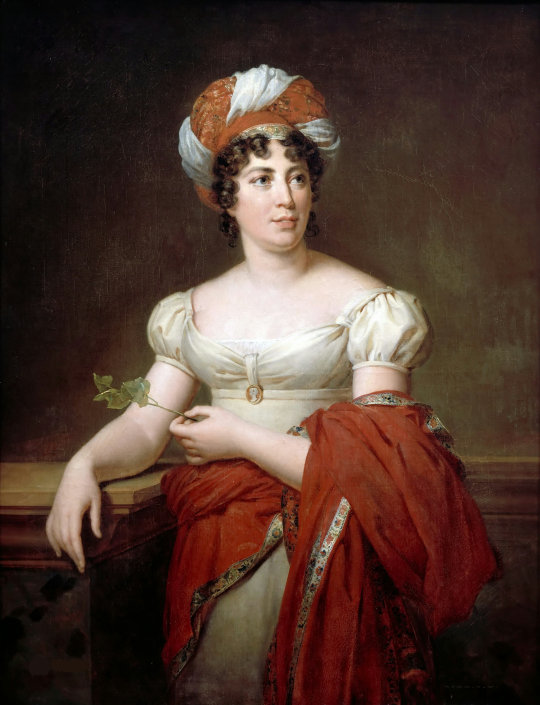#mme de stael
Explore tagged Tumblr posts
Text
Mme de Stael Quotes
"Love is admiring with the heart. And admiring is loving with the mind." 10 Mme de Stael Quotes
1 note
·
View note
Text
So, there's this scene in Cousin Bette, which has a pretty striking line:
– On a marché, dit le vieillard en se retirant, et les morts vont vite à Paris !
(Honoré de Balzac, La cousine Bette, 1846)
“The world moves on,” said the old man, as he withdrew, “and the dead move quickly in Paris!”
(tr. James Waring) (given the implications, I would translate the first half of Vautrin's reply as “We have made our move”)
and I was like, critique of capitalism, etc etc. My friend @madmerchant said she was pretty sure she'd read something very similar in Dracula. Was Stoker referencing Vautrin? Was it a coincidence? There's a persistent shroud of the Fantastic surrounding Vautrin, it would not be surprising if someone would have thought of him as a vampire, or an immortal creature of some kind... however:
“You are early to-night, my friend.” The man stammered in reply:—“The English Herr was in a hurry,” to which the stranger replied:—“That is why, I suppose, you wished him to go on to Bukovina. You cannot deceive me, my friend; I know too much, and my horses are swift.” As he spoke he smiled, and the lamplight fell on a hard-looking mouth, with very red lips and sharp-looking teeth, as white as ivory. One of my companions whispered to another the line from Burger’s “Lenore”:— “Denn die Todten reiten schnell”— (“For the dead travel fast.”)
oooh. this lead to discovering that Lenore, is one of the cornerstones of Romanticism. So it wasn't that Stoker was referencing Vautrin's last incarnation, but rather, the same originary poem Balzac hismelf was referencing. The influence of the poem was huge, and epsecially the french went crazy over it. The first translation was published in the Journal des Débats in 1811, translated from English. The newspaper published it, not without adding the poem put in display "the most odious vices of the German School".
It was not until Mme de Saël (she of the North vs South temperaments fame) wrote an article trully valuing the work as the poetic masterpiece it was, that the fever for Lenore started to root on the young minds of a Certain Group of Artists-and their readers- in 1820. Madame de Saël had thrown the gauntlet:
"No french translation, be it prose or verse, could express all the nuances and detaild of the German original."
and one Gérard de Nerval picked it up, offering FIVE translations of his own throuout the years...
The poem collects a German folk story, and as soon as you read the summery you *know* why the more edgy Romantics were crazy about it. Like other German folk tales (as Der Erlkönig) it features a frenzied ride through the forests, and a lover that is not what he seems to be (he is DEATH. The RIde is A TRAP) Embroildled in the poem are some anti nobility aspects:
"(in Lenore, we hear) The powrful and pained voice of a Titan, tormented until death by the aristocracy. (...) In German language, 'Bürger' (the poet's name) is synonimous to citoyen"
(Heinrich Heine)
and a desire to revindicate the autochthonous, popular poetry from the lower classes -the Lenore poem is recolected from a popular song Bürger heard a young peasant singing- as the true voice of a nation:
It will remain eternally true that if we have no Volk, we shall have no public, no nationality, no literature of our own which shall live and work in us. Unless our literature is founded on our Volk, we shall write eternally for closet sages and disgusting critics out of whose mouths and stomachs we shall get back what we have given.
(Johann Gottfried Herder)
So, what I'm saying is, I must read Lenore, and also, it is very likely that that Vautrin line is a direct reference to that icon of the dawn of French Romanticism, something the then elders (cousin bette was published in 1846) would have remembered and understood...
#french romantics#LENOREE!!#an incredibly influential poem ppl seem to overlook#thanks thoma for your brains/the talk XD#vautrin related#balzac related#nerval and stael#the origins of international romanticism#my source for the mme de stael quote and the nerval translations is an article on Lenore in Spain#by José Escobar#u can download it in the english wikipedia entry for lenore#lenore mania#French Romanticism Memes/catalogue of references they shuffled about#ofc nerval was a fan it’s his special interest-> german literature
21 notes
·
View notes
Text
Okay why does this low-key reads like a list of my favourite historical figures and authors?
Also love the bi representation here! (nothing but respect for Keynes - a certified bicon ✨)

Gay Men and Women Who Enriched the World (1988)
#also side note but why haven't I heard that about Mme de Stael?#and you - the person reading this xx#<- right back at you!#not even sure about the accuracy but hey I need this on my blog!#queer history#history#tagamemnon#classics#literature memes
30 notes
·
View notes
Text
THIS DAY IN GAY HISTORY
based on: The White Crane Institute's 'Gay Wisdom', Gay Birthdays, Gay For Today, Famous GLBT, glbt-Gay Encylopedia, Today in Gay History, Wikipedia, and more … December 4



1777 – Juliette Récamier, French socialite born (d.1849); a Frenchwoman who was a leader of the literary and political circles of the early and considered to be the most beautiful woman of her time. Born in Lyon and known as Juliette, she was married at fifteen to Jacques Récamier a rich banker more than 30 years her senior. At the time, it was said that he was in fact her natural father who married her to make her his heir. Beautiful, accomplished, with a real love for literature, she possessed at the same time a temperament which protected her from scandal, and from the early days of the French Consulate to almost the end of the July Monarchy her salon in Paris was one of the chief resorts of literary and political society that pretended to fashion.
The habitués of her house included many former royalists, with others, such as Jean-Baptiste Bernadotte and Jean Victor Marie Moreau, more or less disaffected to the government. This circumstance, together with her refusal to act as lady-in-waiting to Empress consort Josephine de Beauharnais and her "friendship" for Anne Louise Germaine de Staël, brought her under suspicion.
When a history says someone's sex life is "unconventional" it can sometimes mean little more than the subject enjoyed something other than the standard missionary position with his clothes on and the lights off. When a woman's sex life is even mentioned, no less described as "unconventional" then you better sit up and take notice. Madame de Stael was such a woman. In 1798, separated from her own husband and living with yet another male lover, she met up with Madame Recamier. De Staël was 31, Juliette was ten years younger.
"She fixed her great eyes upon me," wrote Juliette, "and paid me compliments about my figure which might have seemed exaggerated and too direct had they not seemed to have escaped from her. From that time on, I thought only of Mme. de Staël."
They lived together for the next 19 years until de Staël died. Her final words to Recamier, to whom she had once written, "I love you with a love that surpasses that of friendship," were "I embrace you with all that is left of me."


1875 – Rainer Maria Rilke, Austrian poet (d.1926); Austria's greatest modern poet is included here because Harold Nicolson, who knew him, and whose perception generally demands consideration and respect, believed Rilke to be Gay. W.H. Auden once dismissed Rilke as "the greatest Lesbian poet since Sappho." Since Auden wasn't on particularly good terms with Harold Nicolson, it's more than likely that he came to his own conclusion about there being something "different" about the poet.
For many years, Rilke lived in Paris, where he was secretary to the sculptor Augúste Rodin, himself supposedly Gay. Since Rodin was an intimate of Diaghelev and Nijinsky, it seems unlikely that Rilke did not move in the same Gay circle. Cocteau, for example, knew the poet and even invented a story that Rilke had been in love with him.


1936 – John Giorno (d.2019) was an American poet and performance artist. He founded the not-for-profit production company Giorno Poetry Systems and organized a number of early multimedia poetry experiments and events, including Dial-A-Poem. He became prominent as the subject of Andy Warhol's film Sleep (1964). He was also an AIDS activist and fundraiser, and a long-time practitioner of the Nyingma tradition of Tibetan Buddhism.
Giorno was born in New York City, and was raised both in Brooklyn and the Long Island town of Roslyn Heights. He attended high school at James Madison High School in Brooklyn and graduated from Columbia University in 1958, where he was a "college chum" of physicist Hans Christian von Baeyer. While in his early twenties, he briefly worked in New York City as a stockbroker. In 1962 he met Andy Warhol during Warhol's first New York Pop Art solo exhibit at Eleanor Ward's Stable Gallery. They became lovers and Warhol remained an important influence for Giorno's developments in poetry, performance and recordings.
Warhol's 1964 silent film Sleep shows Giorno sleeping on camera for more than five hours. A lesser-known Warhol film featuring Giorno, John Washing (also 1963), runs a mere 4½ minutes. Giorno and Warhol are said to have remained very close until 1964, after which time their meetings were rare. Their relationship was revived somewhat in the last year before Warhol's death. Inspired by Warhol, and subsequent relationships with Robert Rauschenberg and Jasper Johns, Giorno began applying Pop Art techniques of appropriation of found imagery to his poetry.Giorno died of a heart attack at age 82 on October 11, 2019, at his home in Lower Manhattan. At the time of his death, he was married to Swiss artist Ugo Rondinone.


1940 – Richard Robbins (d.2012) was an American-born composer, best known for his motion picture scores for the Merchant Ivory films.
Richard Robbins was born in South Weymouth, Massachusetts and began his musical studies at the age of five. A graduate of the New England Conservatory, he received a Frank Huntington Beebe Fellowship and continued his studies in Vienna, Austria.
In 1976, while he was acting director of the Preparatory School at Mannes College of Music, Robbins taught the youngest daughter of Ruth Prawer Jhabvala, the noted novelist, screenwriter and winner of the Man Booker Prize for her novel Heat and Dust. Jhabvala introduced Robbins to filmmakers Ismail Merchant and James Ivory, which launched their longtime collaboration.
James Ivory has said of Robbins: "I always felt that if anything happened to him and we didn't have his music, then it really wouldn't be a Merchant Ivory film. His music was integral to our films."
Robbins first work in film was Sweet Sounds, a documentary about gifted five-- year old music students, conceived and directed by Robbins and produced by Merchant and Ivory. Robbins also composed the score for the 1983 film adaptation of Jhabvalas' Heat and Dust.
Robbins went on to create the score for nearly every Merchant-Ivory film from The Europeans in 1979 to The White Countess in 2005.
He won a Golden Osella from the Venice Film Festival for Maurice (1987), was nominated for two Academy Awards for Best Original Score for Howards End (1992) and The Remains of the Day (1993). His score for A Room with a View (1985) won him a British Academy Award.
Robbins work was honored in 1996 at a gala benefit concert at Carnegie Hall supporting AIDS research. Robbins was passionate about his dogs , his gardens, and all aspects of the natural world.
His long-time partner was painter Michael T. Schell. In 1994, the couple collaborated on Via Crucis, a musical and visual collage representing the Stations of the Cross.
Richard Robbins died on November 7, 2012 at age 71 at his home in Rhinebeck, New York , following a long struggle with Parkinsons disease.
The clip below is the music from the end titles of Maurice, the Merchant-Ivory film based on E. M. Forster's novel of homosexual awakening and love. (2m38s)
youtube


1959 – Jon Ginoli, born in Peoria, Illinois, is an American guitarist. He is best known as a member of the band Pansy Division, which was founded by Ginoli and Chris Freeman in 1991. Pansy Division is known as one of the founding examples of the queercore genre of punk rock. He is openly gay.
Ginoli, with Pansy Division, was featured in the 1997 documentary film Queercore: A Punk-U-Mentary by Scott Treleaven; as an actor, in the 2002 comedy short Going West by Michael Mew; and in the 2008 film Pansy Division: Life in a Gay Rock Band by Michael Carmona.
Prior to Pansy Division, Ginoli was a singer, songwriter and guitarist for an indie band called The Outnumbered, which he formed while an undergraduate at the University of Illinois at Urbana-Champaign. While in college, Ginoli served a short stint as a DJ at Urbana radio station WPGU. Ginoli is a 1978 graduate of Richwoods High School. In 1977 he created his own rock and roll fanzine, Hoopla.


Bettel (R) with husband Gauthier Destenay
2013 – Openly gay Xavier Bettel (born 3 March 1973) is sworn in as Luxembourg’s Prime Minister. He is a Luxembourgish politician and lawyer, serving as the 24th Prime Minister of Luxembourg since 4 December 2013 after succeeding Jean-Claude Juncker.
Bettel is Luxembourg’s first openly gay Prime Minister and, worldwide, the third openly gay head of government following Iceland’s Prime Minister Jóhanna Sigurðardóttir (born 4 October 1942) (2009–2013) and Belgium’s Prime Minister Elio Di Rupo (born 18 July 1951) (2011–2014).As of 2017, he is one of three openly gay world leaders in office, the others being Leo Varadkar (born 18 January 1979), the Taoiseach of Ireland; and Ana Brnabić (born 28 September 1975), the Prime Minister of Serbia. Bettel has been in a partnership with Gauthier Destenay since March 2010. They married on 15 May 2015; same-sex marriage law reforms had come into effect on 1 January 2015, after passing in June 2014.


6 notes
·
View notes
Text
Napoleon's attempt at Talleyrand-like wit
The First Consul, on the presentation of Mr. Livingston (American ambassador), complimented him, through an interpreter, on the purity of manners in America, and added "The old world is very corrupt;" then turning round to M. de ——, he repeated twice, "Explain to him that the old world is very corrupt: you know something of it, don't you?"
Ten Years Exile by Mme de Stael (1821).
project gutenberg
#people who hate Napoleon#madame de stael#memoirs#FIrst Consul#purity of manners in the united states??#Livingston spoke no French
5 notes
·
View notes
Text
Sum up your favourite (or not) people in one strapline.
Jean-Jacques Rousseau: ‘not good at parties’
‘Infamy infamy, they’ve all got it in for me!’ (With apologies to Carry on Cleo)
Camille Desmoulins: ‘Ch-ch-changes, there’s gonna have to be a different man’
Jean-Paul Marat: ‘Who will watch the watchmen?’
‘Thrill me, chill me, fulfil me, creature of the night!’
Madam Roland: ‘O, Liberty!’
Napoleon: ‘Death is nothing’
Talleyrand: ‘a shit in silk stockings!’ (Sorry, too good to resist)
Mme de Stael: ‘Oedipus sex’
Max Robespierre: ‘an orange a day keeps the headaches away’
‘Cast not pearls before swine’
Georges Danton: ‘Who dares wins’
‘Carpe diem’
Antoine Saint-Just: ‘I see a little silhouetto of a man… thunderbolt and lightning, very, very frightening’
‘The king must die!’
Mirabeau: Live fast and die having fun’
Fouché or Bertrand Barere: ‘Last man standing’
Marie-Antoinette: ‘Little Bo Peep, bleep, bleep, bleep’
5 notes
·
View notes
Text

19-690 Mme de Staël, vous avez tout
https://soundcloud.com/jlgaillard/mme-de-stael-vous-avez-tout
Madame de Staël est considérée comme une des importatrices du mouvement romantique en France, avec son défenseur et ami François René de Chateaubriand. Fille de Necker, la jeune femme reçut une excellente éducation et grandit au contact des grands noms de la vie intellectuelle française, ce qui fit d'elle une femme curieuse, libre et ambitieuse, animée par l'esprit des Lumières. Femme de lettres et écrivain, vivement opposée à Napoléon Ier, Germaine de Staël passa une grande partie de sa vie en exil, en Suisse notamment, où elle fonda le Groupe Decoppet.
Une jeune fille de famille chrétienne, habitant à la campagne, eut l’occasion de lire les livres « Delphine » et « Corinne » écrits par Mme de Staël. À la suite de sa lecture, sa vie tranquille lui sembla insipide et vide. Elle trouva l’adresse de la romancière et lui écrivit pour lui proposer de devenir sa secrétaire. Son désir était de pouvoir suivre l’écrivain et de voyager avec elle.
Un rendez-vous fut pris. Au cours de la rencontre, la jeune fille se jeta aux pieds de Mme de Staël en la suppliant de la prendre avec elle. Avec gentillesse et calme, la femme de lettres lui répondit :
« Vous pensez que ma vie est enviable parce que je voyage dans l’Europe entière et que je visite les plus beaux salons, mais rien de tout cela ne peut remplacer un vrai foyer, une vraie famille. Vous avez une vraie famille, moi je voyage parce que je n’en ai pas. Vous avez un bon père, moi je n’en ai plus. Vous avez le calme, la tranquillité, je n’en ai pas du tout. N’enviez pas mon sort, retournez chez vous, appréciez tout votre bonheur à sa juste valeur, il est inestimable ».
La jeune fille repartit chez elle, et les illusions qu’elle s’était faites à la lecture de ces livres disparurent. Dieu s’était servi de l’écrivain pour lui ouvrir les yeux.
Aujourd’hui même, louons Dieu pour les nombreuses bénédictions inestimables qu’IL nous a accordées et qu’IL nous prodigue encore : pardon, paix, provision, famille, frères et sœurs. Ne cherchons pas auprès du monde notre bonheur, la Parole de Dieu nous dit dans Colossiens, 2 :10.
« Vous avons tout pleinement en Jésus-Christ qui est le chef de toute domination et de toute autorité ! »
On recherche des difficultés alors que la vie est plus simple !
#romantique #mouvement #education #ecriture #ecrivain #exil #insipide #romancière #pied #europe, #lecture #livre #tranquillité #sort #yeux #pardon #paix
0 notes
Text
aa poor Mme de Stael... but I can see it.
Marat *has* to be Rizzo!
Give me a 5,000 budget and I’ll make the most historically accurate French Revolution movie ever but on one condition. Everyone but Couthon is a muppet.
154 notes
·
View notes
Photo

Literary history that happened on 28 September
#september 28#literary history#literary#history#literature#on this date#herman melville#elmer rice#prosper merimee#mme de stael
154 notes
·
View notes
Photo

Anne Louise Germaine de Staël-Holstein, commonly known as Madame de Staël
In 1814 one of her contemporaries observed that "there are three great powers struggling against Napoleon for the soul of Europe: England, Russia, and Madame de Staël"
2 notes
·
View notes
Text






Somewhere in the afterlife, Charles Reade and Mme de Stael are having joint crying sessions out of envy that they did not write this first.
19 notes
·
View notes
Note
I'm now very curious what, in your universe , Mrs. Arbuthnot thought of Duchess Lizzy!
Haha well, they were very similar, despite being on opposite sides of the political spectrum, so they get along! Plus I think Mrs. Arbuthnot kind of viewed Lizzy with an, “Ah yes, she’s One of Us” kind of mentality. Like, here’s another smart, honest, politically intelligent woman, who knows how to dress and how to wield soft power, and how to properly run a household and plan a ball. If they fight it’s not over like, “You said something I misconstrued,” it’s about the likeliest effect of the Corn Laws. They’re on the same playing field and observe the same rules of the game, even if they’re on different sides. Kitty got lost on the way over to the field.
I actually just mocked up a little diary entry in response to a comment on Ao3 so I’ll include it here too (ignore the fact that Harriet Arbuthnot was not keeping a diary in 1817 please):
August 1817.
The Duke told me today, as the Duchess was at Mme de Stael’s, that he has at last realized why Mr. Darcy behaved so very oddly when the Duke was first trying to make the Duchess love him.
Offended propriety was my guess, for I know the Duke had interested himself in the Duchess well before her mourning was over, and Mr. D is a high stickler.
“Yes and no.”
I confessed to some curiosity, then, for the Duchess and Mr. D seemed on very excellent terms after the Duchess’s first husband died, and the Duchess does not talk of their falling out– I daresay the Duchess only ever told the whole of it to the Viscountess Stornoway– but as Mr. D had not come to the Duke and Duchess’s wedding it was clear the Duchess saw it as a reproach to her and was too angry to keep up the friendship until he apologized.
I still recall how ridiculous everyone thought Mr. D and Lady C de B were being at the time. EVERYONE knew that the Viscountess Stornoway had been plotting the marriage since the Duke shewed his interest and the Duchess– or the Widow Fitz, as she was then– held him off so persistently. (She is a very GOOD sort of woman, with all that implies.) Heavens, Lord Matlock was so keen on the match even Caro Lamb picked up on it! If the Fitzwilliam notion of one true matches was not so strictly upheld in the major brach of the family, the auxiliary branches should not have complained, especially when they stood to gain so much by such a match.
The Duke said that was not quite the case, and did not think the Duchess would mind his saying that she and Mr. D had a “grand breeze” the day before the wedding, where Mr. D accused the Duke of being the worst kind of rake, and wishing to marry the Duchess because it was the only way to gain admittance to her bed. The Duchess obviously flew into the bows at this and attributed this accusation both to the Duke’s old reputation and to a childhood friend of Mr. D’s who had become a rake and ended up in Australia for debt.
The Duke said it was jealousy- he had known Mr. D to be jealous of him, and his success with the Duchess since January of ‘16. I could not hide my surprise at this. If Mr. D really had been in love with the Duchess he did a very good job of hiding it. The Duke then asked if I had seen the Times announcement that Fitzwilliam Darcy was to be married to Lady ELIZABETH Villiers.
I was v. v. shocked– cried that everyone know Colonel and Mrs. Fitzwilliam had been a true match!
The Duke said that they were, he knew this to be true, for he had obviously seen the Duchess’s mark, and he had called on her not an hour after her first husband died, and called on her frequently during her year of mourning. All that she felt and thought of, during that year of mourning, was what he had felt and thought following the loss of his soulmate. Mr. D had convinced himself into a misunderstanding.
I asked if he would he tell the Duchess of his suspicions, but the Duke thought not. She and Mr. D were only just now on good terms again, and Mr. D had clearly met his true match and gotten over such foolishness. Then the Duke laughed and said the Duchess probably would not believe him if he DID tell her of his theory. She had never picked up on the fact that Mr. D had liked her in '16. I teased the Duke that that had been because she had been to dazzled by HIS attentions and the Duke looked very smug about it and said again how fortunate he was to have secured the love of such a woman as the Duchess. He confessed to me that no one had ever loved him the way the Duchess does, and I think it clear that the Duke has never loved anyone as he does the Duchess. It is nice to see the Duke properly partnered at last. I only wish she could be brought to the Tories. With HER on our side, why, we should have control of the Commons within the year.
31 notes
·
View notes
Text
An elusive sphinx
Madame de Staël, who dined at his side one evening in the company of Sieyès, depicts an elusive sphinx, above all anxious to protect himself: “I carefully examined the face of Bonaparte; but each time he discovered my observant glance, he had the art of depriving his eyes of all expression, as if they had turned to marble. His face was motionless then, except for a vague smile which he placed on his lips at random, to confuse anyone who would observe the outward signs of his thoughts.”
La chute de Napoléon by Dominique Villepin, 2015

39 notes
·
View notes
Photo

Judy Chicago
Reincarnation Triptych: Mme. De Stael
1974
368 notes
·
View notes
Photo

19-690 Mme de Staël, vous avez tout ! https://soundcloud.com/jlgaillard/mme-de-stael-vous-avez-tout Madame de Staël est considérée comme une des importatrices du mouvement romantique en France, avec son défenseur et ami François René de Chateaubriand. Fille de Necker, la jeune femme reçut une excellente éducation et grandit au contact des grands noms de la vie intellectuelle française, ce qui fit d'elle une femme curieuse, libre et ambitieuse, animée par l'esprit des Lumières. Femme de lettres et écrivain, vivement opposé à Napoléon Ier, germain de Staël passèrent une grande partie de sa vie en exil, en Suisse notamment, où elle fonda le Groupe Decoppet. Une jeune fille de famille chrétienne, habitant à la campagne, eut l’occasion de lire les livres « Delphine » et « Corinne » écrits par Mme de Staël. À la suite de sa lecture, sa vie tranquille lui sembla insipide et vide. Elle trouva l’adresse de la romancière et lui écrivit pour lui proposer de devenir sa secrétaire. Son désir était de pouvoir suivre l’écrivain et de voyager avec elle. Un rendez-vous fut pris. Au cours de la rencontre, la jeune fille se jeta aux pieds de Mme de Staël en la suppliant de la prendre avec elle. Avec gentillesse et calme, la femme de lettres lui répondit : « Vous pensez que ma vie est enviable parce que je voyage dans l’Europe entière et que je visite les plus beaux salons, mais rien de tout cela ne peut remplacer un vrai foyer, une vraie famille. Vous avez une vraie famille, moi je voyage parce que je n’en ai pas. Vous avez un bon père, moi je n’en ai plus. Vous avez le calme, la tranquillité, je n’en ai pas du tout. N’enviez pas mon sort, retournez chez vous, appréciez tout votre bonheur à sa juste valeur, il est inestimable. » La jeune fille repartit chez elle, et les illusions qu’elle s’était faites à la lecture de ces livres disparurent. Dieu s’était servi de l’écrivain pour lui ouvrir les yeux. Aujourd’hui même, louons Dieu pour les nombreuses bénédictions inestimables qu’il nous a accordées et qu’il nous prodigue encore : pardon, paix, provision, famille, frères et sœurs. Ne cherchons pas auprès du monde notre bonheur, la Parole de Dieu nous dit dans Colossiens, 2 :10. « https://www.instagram.com/p/CiZ6uC-MrLp/?igshid=NGJjMDIxMWI=
0 notes
Text
lmao holy shit how did i not know that mme de stael’s father was jacques necker
0 notes